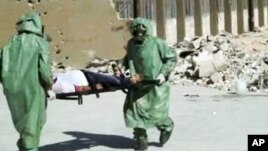12 March, 2016
U.S. military officials say they captured a key person in the Islamic State's chemical weapons program in Iraq.
The IS operative was captured by American special-operations forces. New gas attacks by the terror group were reported there Wednesday.
The suspect was not identified. His detention was reported last week, but his connection to chemical weapons was not announced until now. The IS suspect was taken during raids in Iraq and Syria by a U.S. "expeditionary targeting force." Their duty is to collect intelligence and identify high-level IS leaders.

People in protective suits and gas masks conducting a drill on how to treat casualties of a chemical weapons attack in Aleppo, Syria, in this image made from an AP video posted on Wednesday, Sept. 18, 2013.
A Pentagon spokesman, Captain Jeff Davis, would not comment on recent operations. But he gave general information about the expeditionary targeting force.
"One of the goals, one of the missions we anticipate they will do is that they will capture a small number of ISIL leaders," he said, using another name for Islamic State.
"The detention of these we anticipate to be very short term. It will be coordinated with Iraqi authorities."
Officials in Iraq told VOA that IS fighters fired chemical weapons late Tuesday and early Wednesday. They said IS fired rockets loaded with mustard gas, also known as sulfur mustard, into a town north of Baghdad.
Iraqi and Kurdish officials said dozens of civilians were injured by the attack on Taza Khurmatu. Most residents of the town are Shi'ite Muslim ethnic Turkmens.
Soran Jalal, head of Taza Khurmatu's civil defense office, said "the rockets spread a garlicky smell, and caused nausea and vomiting." He told VOA that investigators confirmed the weapons carried mustard gas.
A commander in Kirkuk, the Kurdish population center north of Turkmen town, estimated about 30 people required hospital treatment. Lieutenant Muhammad Qadir told VOA at least five of the wounded had facial burns caused by chemical agents.
Separately, a police official in Kirkuk said it was determined the rockets were fired from territory controlled by the Islamic State group.
U.S. officials are aware of the group's use of such weapons. They say IS has used chemical weapons more than once in both Iraq and Syria.
"This is a group that does not observe international laws or international norms. They have demonstrated they will stop at nothing to inflict death and destruction on innocent people," Pentagon spokesman Davis said.
"Sulfur mustard - it's usually in a powdered form and it's put into artillery shells, rockets. And when those blow up it creates a dust cloud that can primarily aggravate but in large doses can absolutely kill."
U.S. officials say IS is still developing its chemical weapons program. So some reports about the terror group's use of chemical weapons on the battlefield is "still largely about fear."
The officials say IS fighters find it easier to make and use improvised explosive devices (IEDs) or suicide bombers to injure and kill people.
I'm Anne Ball.
VOA's Jeff Selden wrote this story, with additional information provided by VOA's Sharon Behn in Iraq and reporters Rikar Hussein and Dlchad Anwar. Anne Ball wrote the report for Learning English. Kathleen Struck was the editor.
We want to hear from you. Write to us in the Comments Section, and join us on 21voa.com.
______________________________________________________________
Words in This Story
expeditionary – adj. relating to an expedition—a journey by a group of people for a specific purpose
anticipate – v. to think of something that might happen in the future
garlicky – adj. related to the garlic plant that has a strong taste and smell
nausea – n. the feeling in your stomach when you feel like you are going to vomit
vomit – v. to have the food and liquid in your stomach come out through your mouth when you are sick
aggravate – v. to make a problem or an injury more severe